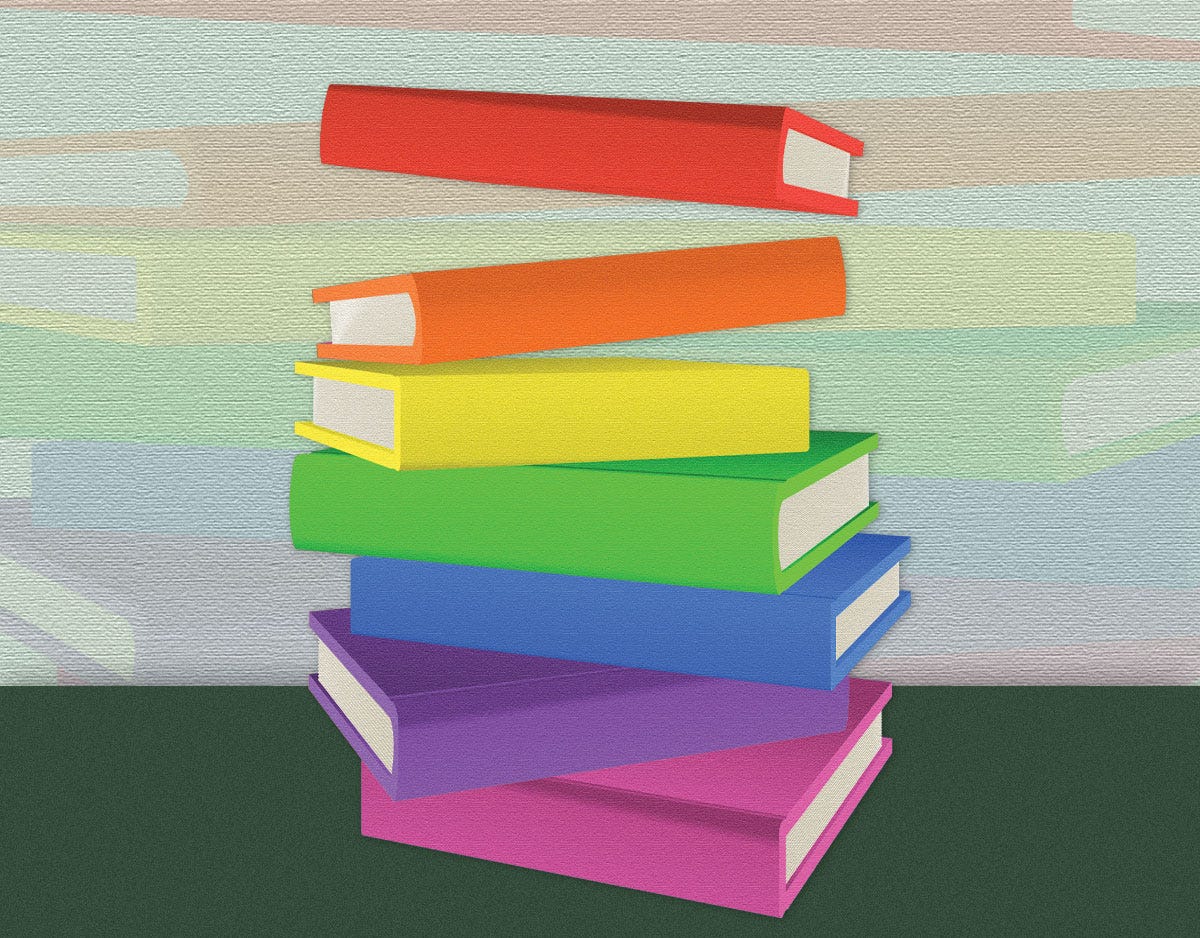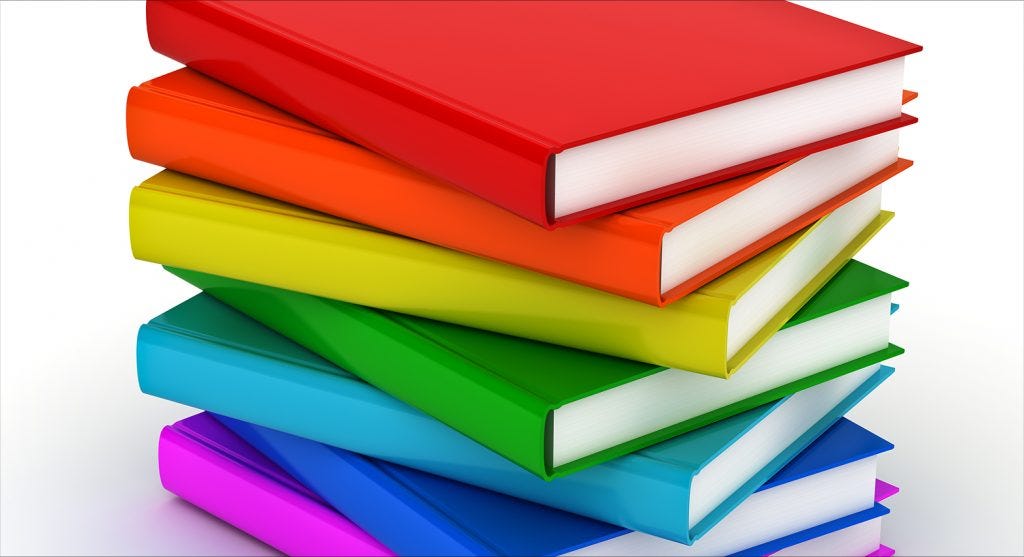Hello and welcome to this year’s YA-reading-recs-for-Pride list, following on from last year’s post. For those of you who’ve only subscribed recently for the short-story stuff (hi! You’re very welcome!), you may not know that I am a big YA nerd (narrator: everyone knows).
I’ve been writing YA novels for many years, did a stint in children’s and YA publishing, wrote a masters’ thesis on one particular MG series, and review YA fiction regularly for the Irish Times. It’s not the only thing I love (see also: contemporary Irish writing of all flavours, lit fic, commercial/genre fic, TV, the overthinking of the aforementioned topics) but it is a specialism, if you like.
Also, lists are fun.
For this list I’ve focused on queer1 content rather than the known or presumed identity of the authors, though there is of course overlap, because the tendency - particularly in certain genres - to demand authors share their sexual orientation with readers, under the guise of ‘we want to know if this rep is authentic!’ fills me with a whole lot of rage.2 You may well disagree, for very valid reasons3, but it’s the choice I’ve made here.
Final caveat: this is a personal list, rather than anything I have been commissioned to do. It is absolutely not definitive.4
Retellings: Songs for Ghosts by Clara Kumagai evokes Madama Butterfly in contemporary Japan while Laura Steven’s Every Exquisite Thing is a sapphic drama-school retelling of The Picture of Dorian Gray.
Extremely tropey boarding-school tales: Don’t Let The Forest In by CG Drews is unhinged, I love it. Rom-com queen Sophie Gonzales takes on royal romance in Nobody In Particular. Openly Straight by Bill Konigsberg also goes here.
Historical angst: The Boy I Love by William Hussey and - not pitched as YA but they are in their late teens for most of it - In Memoriam by Alice Winn look at love in the trenches of World War I.
Irish writers: I originally typed ‘fox’ for the magical-realist A Fix of Light by Kel Menton, which is apt; You Don’t See Me by Chris Ricketts leans more towards realism; for fantasy titles, please take a look at Amy Clarkin and Helen Corcoran. With an eye on Irish history, check out Sue Divin’s Truth Be Told and Moira Fowley’s All The Bad Apples. (And not YA, but with young protagonists - Sunburn by Chloe Michelle Howarth, At Swim Two Boys by Jamie O’Neill, Stir-fry by Emma Donoghue.)
Did you know queer boys and straight boys can be friends: the obvious pick here is Margaret McDonald’s excellent Glasgow Boys, which just nabbed the Carnegie, but might I also suggest Stewart Foster’s Pieces Of Us.
Weird but run with it: A.S. King’s Ask The Passengers and her latest, Pick The Lock. Let’s throw in the Greek chorus of David Levithan’s Two Boys Kissing, also.
You’ve probably read these writers already but they need to be mentioned: Adam Silvera, Becky Albertalli, Casey McQuiston, Robin Talley, Simon James Green, William Hussey, Josh Silver.
Books to note when people imagine that queer YA sprung into existence five minutes ago: I'll Get There. It Better Be Worth The Trip by John Donovan; Dance On My Grave by Aidan Chambers; Boy Meets Boy by David Levithan; Hey, Dollface by Deborah Hautzig; Baby Be-Bop by Francesca Lia Block; Annie On My Mind by Nancy Garden.
And for last year’s post:
YA reading recs for Pride 2024
“Should I make a YA reading list for Pride?” I mused on Instagram while avoiding doing other things, and I was not swiftly discouraged. So. Here you go. (Hurray for displacement activities!)
Other resources that may be useful:
Children’s Books Ireland, Pride 2025 reading guide
BookRiot, The Queer YA Canon
Michael Cart & Christine A. Jenkins, Representing the Rainbow in Young Adult Literature: LGBTQ+ Content since 1969
It’s also outsourcing your own critical assessment of a text, prioritising author-identity over author-skill, author-capacity-to-write-persuasively-about-a-particular-thing. I get where it’s coming from, and how it is often from a good place - adopting activist language to make a point about poor representation. But folks, if you’ve ever been in a creative writing class, you will know that having experienced something does not mean you can write well about it. And treating fiction as though it’s - not even memoir, which itself is crafted and shaped, but as though it’s just your brain/life directly spilled onto the page… it’s insulting to the work, and it tends to lead to writers being interrogated over their personal experiences, and it’s parasocial entitlement gone wild, basically.
For example, there are gay male writers who find Heartstopper problematic, and I think there are conversations we can have about how slash fic has shaped certain demographics… but I have chosen not to get into it here.
But when I have been commissioned on such topics, in the past, I have inevitably received a fair bit of nonsense, particularly if the books are aimed at young people, and while that’s expected from one side of the political aisle, shouting at women with opinions is a fun activity for people across the spectrum. So, you know, I appreciate you might find these notes-before-I-go-into-book-rec-mode a little tiresome and overly-cautious, and indeed I do too, but. Y’know. The internet.





